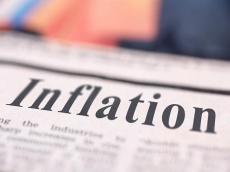|
|
TODAY.AZ / Business
Inflation in Azerbaijan to slow down
25 January 2022 [17:32] - TODAY.AZ

By Azernews
By Ayya Lmahamad
S&P Global Ratings has predicted that Azerbaijan's average annual inflation rate would be 6.5 percent in 2022.
Simultaneously, the country's average annual inflation rate is expected to be 4.5 percent in 2023, before slowing to 3 percent in 2024-2025.
It is important to note that inflation is defined as a consistent rise in the general price level of goods and services. The price of goods and services is primarily determined by market supply and demand, with some prices regulated by the government.
Prices rise slowly but steadily when inflation is low. When inflation is said to be decreasing, it means that the cost of the consumer basket is increasing at a slower rate than in previous years.
One of the most commonly used words nowadays is "inflation". It is always considered when making forecasts for the coming years.
Every country's economy is accompanied by inflation, and its acceleration is now a global concern. According to the World Bank, global food prices reached a 10-year high last year.
According to economists, this is primarily due to rising food prices in the context of the COVID-19 pandemic and weather conditions in some countries.
Inflation and the price of foreign-origin food products in Azerbaijan increased in 2021 as a result of external factors.
Azerbaijan's average annual inflation rate was 6.7 percent, with food inflation at 8.1 percent and non-food inflation at 5.1 percent.
It should be noted that food products play a large role in the formation of inflation, accounting for roughly 60 percent of total inflation.
The government is consistently taking steps to mitigate the effects of rising inflation.
The Central Bank, the Economy Ministry, the Agriculture Ministry, the Finance Ministry, the Labor and Social Security Ministry, the State Customs Committee, the State Statistics Committee, the State Agency for Reserves, and other relevant government agencies will develop a flexible and comprehensive anti-inflationary program that will allow the government to control inflation in the short term.
Rising global food prices necessitate the expansion of domestic production of strategic food products, i.e., the replacement of strategic product imports with domestic production.
In this context, it is intended to use the agricultural potential of liberated lands to ensure the country's food security.
Simultaneously, in order to prevent market price manipulation, the State Service for Antimonopoly Control and Consumer Market Supervision established the maximum allowable local prices for flour and bread.
Thus, the wholesale price for a 50 kg bag of flour was set at AZN 35.9 ($21.1), the retail price for 500 gr traditional (round) bread was set at o.50 qapiks (0.30 cents), and the retail price for 650 gr traditional (round) bread was set at 0.65 qapiks (0.30 cents) (0.38 cents).
In 2021, the amount of subsidies per ton of flour and flour products sold in the domestic market was increased. Furthermore, the terms of VAT exemption on the production and sale of flour and bread were extended until 2024, and large grain imports were granted soft loans from the Central Bank.
According to the Central Bank of Azerbaijan's forecasts, the country's inflation will begin to slow in mid-2022.
URL: http://www.today.az/news/business/214856.html
 Print version
Print version
Connect with us. Get latest news and updates.
See Also
- 28 November 2024 [15:14]
Community expresses concern over Polish President's visit to Azerbaijani-Armenian border - 28 November 2024 [13:21]
Azerbaijan adjusts working and holiday schedule for year-end 2024 - 28 November 2024 [13:00]
Construction of Sugovushan-Sarsang reservoir-Gozlukorpu-Kalbajar highway continues - 28 November 2024 [12:46]
Polish diplomat summoned over President Duda's visit to Armenian-Azerbaijani border region - 28 November 2024 [11:27]
Azerbaijan elected deputy chairman of OIC anti-corruption bureau - 27 November 2024 [15:43]
Azerbaijan reveals key agreements advancing the green economy at COP29 - 27 November 2024 [12:57]
Azerbaijan unveils 'Green Growth Portal' to accelerate green transition - 27 November 2024 [12:38]
bp announces new appointments in Azerbaijan-Georgia-Türkiye region - 27 November 2024 [12:03]
Azerbaijan, Lithuania to enhance cooperation in taxation - 27 November 2024 [11:26]
Azerbaijan Economy Minister jointly with Harvard University develop Green Growth Portal
Most Popular
 Baku and Washington return to crisis-free relations
Baku and Washington return to crisis-free relations
 French politics in all its squalor, lies and hypocrisy
French politics in all its squalor, lies and hypocrisy
 Turkish minister: Peace agreement btwn Azerbaijan, Armenia to ensure stability in Caucasus
Turkish minister: Peace agreement btwn Azerbaijan, Armenia to ensure stability in Caucasus
 Banana Parliament of the banana Country
Banana Parliament of the banana Country
 Kazakhstan intends to increase capacity of TM and North-South transit corridors
Kazakhstan intends to increase capacity of TM and North-South transit corridors
 Hikmet Hajiyev strongly condemns Politico for false claims on Azerbaijan's gas imports
Hikmet Hajiyev strongly condemns Politico for false claims on Azerbaijan's gas imports
 Polish diplomat summoned over President Duda's visit to Armenian-Azerbaijani border region
Polish diplomat summoned over President Duda's visit to Armenian-Azerbaijani border region
